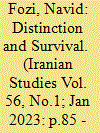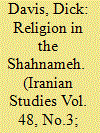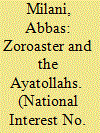| Srl | Item |
| 1 |
ID:
189069


|
|
|
|
|
| Summary/Abstract |
This article argues that the notion of Iranian culture employed in the public discourse of Zoroastrians allows them to tackle the dilemma of Shiʿi-dominated Iranianness without provoking Shiʿi authorities. The piece offers an analysis of ethnographic data, including detailed speech acts documented in Zoroastrians’ ritual spaces and cultural exhibitions. It explores the Zoroastrian configuration of an Iranian culture that summons and encodes pre-Islamic tropes and modern nationalist sentiments by constantly maneuvering around national, religious, and ethnic categories. This configuration's underpinning assumptions, narratives, and texts have powerful platforms in Iranian nationalist imagination. I propose that this arrangement attempts to carve out a space for Zoroastrians’ distinct identity by connecting the history of the Muslim Arab invasion of Persia to the Shiʿi hegemonic norms of Iranian culture today. It further invokes Zoroaster's indigeneity and teachings as the foundation of authentic Iranianness to establish Zoroastrians’ survival as a cultural system.
|
|
|
|
|
|
|
|
|
|
|
|
|
|
|
|
| 2 |
ID:
137387


|
|
|
|
|
| Summary/Abstract |
This article discusses the reasons why Ferdowsi does not begin the Shahnameh with the episode of Zoroaster, which he quotes from the version of Daqiqi, but rather with an account of the creation of the world that, in contrast to Islamic historians writing before Ferdowsi, does not attempt to accommodate a Qur'anic view of creation and human history, but neither does he give a cosmology dominated or well informed by Zoroastrian theology. Similarly, Ferdowsi tends to present pre-Islamic Iran as having a consistent religious history, and perhaps avoids beginning with Goshtāsp's conversion to the religion of Zoroaster, as he makes Daqiqi appear to do, in order to minimize the role of religious conflict in Iranian history, again diverging from historians of the Islamic period writing before him. The article also explores the role of God in the Shahnameh and the absence of theodicy.
|
|
|
|
|
|
|
|
|
|
|
|
|
|
|
|
| 3 |
ID:
101308


|
|
|